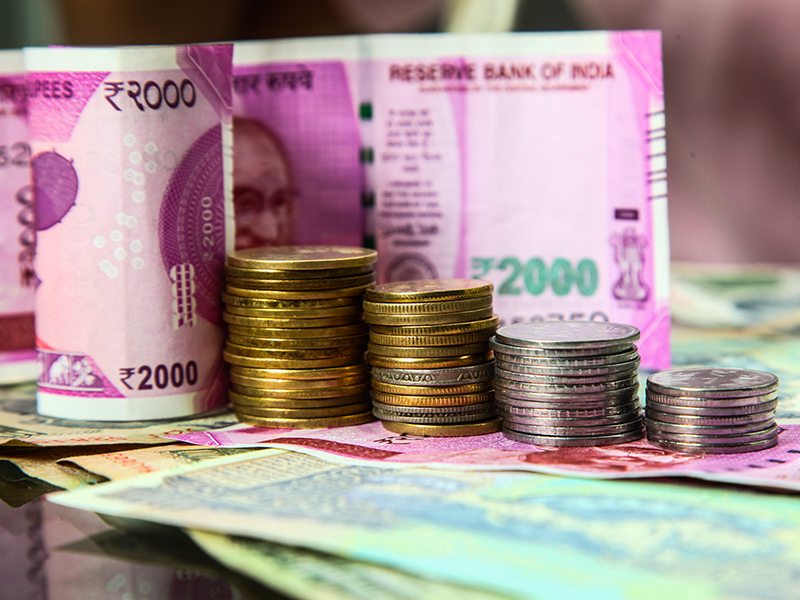H1 2020 review: After a dismal start, banks still not out of the woods; Axis, ICICI Bank top picks
UBS said it is cautious on banks' asset quality, given the weak macro backdrop
 Image: Shutterstock
Image: Shutterstock
Among all the sectors that lost the most in the first half of the calendar year 2020, banks emerged at the top.
Sensex and Nifty50 fell 15 percent each so far in the year 2020, compared to 13 percent fall seen in the S&P BSE Midcap index, and 10 percent decline seen in the S&P BSE Smallcap index.
Among the sectoral losers, banks lost the most, falling 34 percent, followed by realty and metal that lost 31 percent each.
A slowing economy and impact of the COVID-19 outbreak have severely affected bank credit growth.
On a year-on-year basis, the non-food credit growth slowed to just 6.8 percent as of May 22, 2020 compared to 11.4 percent in the previous year. So far in this fiscal year, growth has actually contracted by 2 percent.
In Q4FY20, the Indian banking system witnessed a significant correction amid fears of the emergence of COVID-19 and its impact on business growth and asset quality.
With lenders preparing for an unforeseen rise in NPA, provisioning remained elevated impacting the profitability of many players, brokerage firm ICICI Direct pointed out.
"The economic slowdown kept business growth in single digits, which further got accentuated by lockdown amid COVID-19. Moratorium by the RBI kept asset quality stable though a revival in repayment (post end of the moratorium in August) remains uncertain," ICICI Direct said.
The proportion of moratorium varied vastly with large private banks at 20-30% book in moratorium while mid-sized banks reported nearly 35-70 percent based on the composition of the book (higher for microfinance, CV, LAP, etc).
NBFCs have 50-70 percent book under moratorium and are trying to manage liquidity as the majority did not receive moratorium from banks, said ICICI Direct.
Five public sector banks (PSBs) — State Bank of India (SBI), Bank of India (BOI), Punjab National Bank (PNB), Canara Bank and Bank of Baroda (BoB) — have at least Rs 7.9 lakh crore worth of loans under moratorium.
This amount, which is nearly 20 percent of all local advances, includes loans that were stressed even before the coronavirus pandemic affected the economy, Mint reported.
ICICI Direct expects the advance growth to remain muted in FY21E. MSME segment may witness traction as banks are disbursing loans under credit guarantee schemes, while traction in the retail segment is likely to remain more stringent due to risk averseness.
"As ambiguity remains on the assessment of moratorium by each lender, it is difficult to ascertain faith in asset quality. However, exposure to smaller ticket size loans in rural areas and essential services (for example MFI loans) along with home loans in retail space are expected to revive faster," said ICICI Direct.
A gradual slowdown in the economy has been leading to a deceleration in credit growth since April 2019. As per ICICI Direct, growth in advances was reported in single digits at 6.7 percent in FY20 to Rs 92.1 lakh crore.
The slowdown in economic activity has been further accentuated by the emergence of COVID-19. Lockdown and falling confidence level of consumers is expected to lead to a contraction in GDP in FY21E.
These factors may keep the advances growth moderate in bare minimum positive territory.
Moreover, a lockdown in the first two months of the fiscal and a gradual recovery in CAPEX, discretionary spending in the unlock period are seen impacting fresh disbursements; lower repayment amid moratorium is likely to keep credit growth at multi-year low.
ICICI Direct points out that the corporate segment is expected to bear the brunt led by a gradual uptick in capacity utilisation and the absence of large CAPEX plans.
Job losses, pay cuts, reduction in discretionary spending and increasing caution of lenders on unsecured lending are seen impacting growth in the retail segment ahead.
Global brokerage firm CLSA is of the view that the growth of banks continues to moderate.
The brokerage expects the overall loan growth and retail segment to moderate to 0-2 percent and 5 percent in FY21.
For the top four private banks, CLSA expects loan growth to moderate to 4-8 percent in FY21. The market share gains will drive loan growth to 15 percent for the top four private banks by the end of the year 2022, CLSA said.
Financial firm UBS believes FY21 pre-provision operating profit (PPOP) is also at risk due to narrowing margins and reduced fee income.
"We expect gross NPL formation (slippage) ratios of 7 percent/5 percent in FY21/FY22 (against 8 percent/6 percent earlier) in our base case and 10 percent/7.5 percent in our downside scenario. We cut our FY21-22 earnings estimates for large private banks 2-31 percent," UBS said.
UBS said it is cautious on banks' asset quality, given the weak macro backdrop.
"NPL risks from SME and self-employed remain high, and we fear a portion of corporate loans is also vulnerable," UBS said.
"We use UBS Evidence Lab data on more than 13,000 companies to assess the relative asset quality risks. As per our analysis, IndusInd has a relatively higher exposure to vulnerable corporates, at 24.7 percent of total loans. Kotak also has greater-than-expected exposure to vulnerable corporates, at 13.4 percent of total loans. The recent data on collection and activity has improved from a low base and we would watch this trend to calibrate our asset quality views," said UBS.
The least-preferred stocks by UBS are IndusInd, State Bank of India, Punjab National Bank and Kotak Mahindra Bank. It said it prefers ICICI Bank and Axis Bank due to their retail liability franchises and inexpensive valuations.
Disclaimer: The views and investment tips expressed by investment experts on Moneycontrol.com are their own and not that of the website or its management. Moneycontrol.com advises users to check with certified experts before taking any investment decisions.
Original Source: https://www.moneycontrol.com/news/business/markets/h1-2020-review-after-a-dismal-start-banks-still-not-out-of-the-woods-axis-icici-bank-top-picks-5491351.html